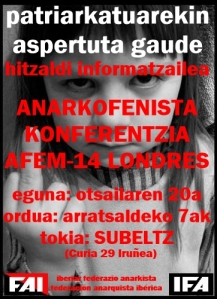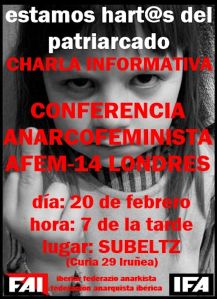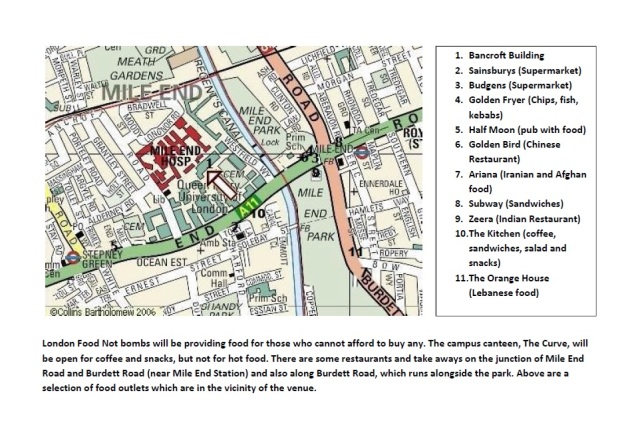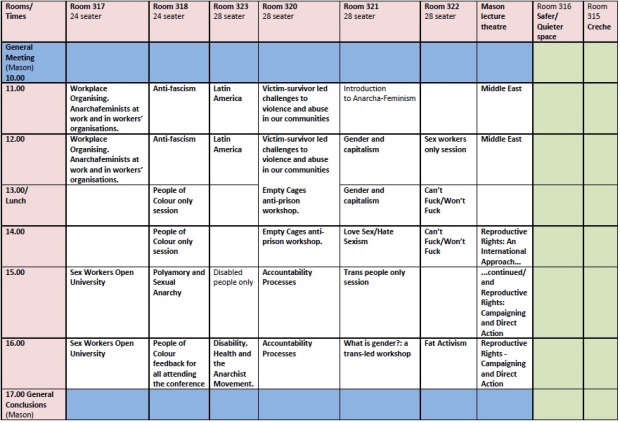Four months have passed since last year’s anarchafeminist conference, and the seeds are starting to spread.
Radical mental health and mutual aid
On 31st January 2015, the organiser of the “Radical approaches to mental health” session organised a follow-up meeting to plan for the future. As it was so successful and over-subscribed, they’re running a second follow up. Details:
Following on from a session at Afem, this is a space to discuss possibilities for radical mental health activism and ways we can support and act in solidarity with each other. We’re hoping to gauge people’s interest and energy in some different ideas and be able to end the day with a plan to move forward.
Some potential ideas include:
- skill-shares such as emotional first aid, active listening, navigating NHS care, understanding trauma
- peer support groups – local or issue based
- co-counselling
- open-mic/storytelling sessions
- bookgroup/talks/film screenings
- direct action/awareness raising activism
If you want to read more about any of these the free zine at mindfuloccupation.org is a good place to start.
Date: Saturday 28/02/2015
Time: 11:30-15:30
Place: Common House, Unit 5E, 5 Pundersons Gardens, Bethnal Green E2 9QG
Facebook event: https://www.facebook.com/events/1557179054550258/1557243531210477/
Eventbrite to sign up: https://www.eventbrite.co.uk/e/radical-mental-health-and-mutual-aid-discussion-second-session-tickets-15629555421
Anarchism in Love, Sex and Relationships: discussion, peer support and solidarity group
After a well-attended workshop at the anarchafeminist conference, the organisers wanted to continue the discussions and build solidarity and peer support through a series of monthly discussion groups.
They held a first session on Sunday 25 January, and have a follow-up one coming up soon. Details:
As well as using a group like this to discuss issues and learn from each other on a more general level (sometimes with the help of lighter reading material, such as short articles and blog pieces), we also want to use it for peer support and solidarity- so not just theoretical abstract discussions! Our feeling was that for a lot of people doing relationships differently can be quite difficult, with little support and guidance in people around you and in the media, and so it would be great if we could provide this for each other. After each meeting, we will aim to also go to the pub together for a chance to get to know each other more.
We will collectively choose a topic to discuss for the rest of the session. Some of the topics that came up during the Afem workshop were for example:
- How to do polyamory/non-monogamy/relationship anarchy ethically? What does “ethically” mean?
- New types of relationships, new labels? Lover, boyfriend, girlfriend, partner, friends, primary, secondaries?
- What are the distinctions and hierarchies between different relationships, such as friends, partners and girlfriends/boyfriends and how does/should this affect our behaviour?
- How does our politics (anarchism, feminism etc.) – and the current politics/policies of the state- affect our relationships? And vice versa: how can our relationships affect our politics? What can we do about this?
Date: Sunday 01/03/2015
Time: 16:00-18:00
Place: LARC, 62 Fieldgate Street, E1 1ES
Facebook event: https://www.facebook.com/events/349840648553483/
Basque anarchafeminism




